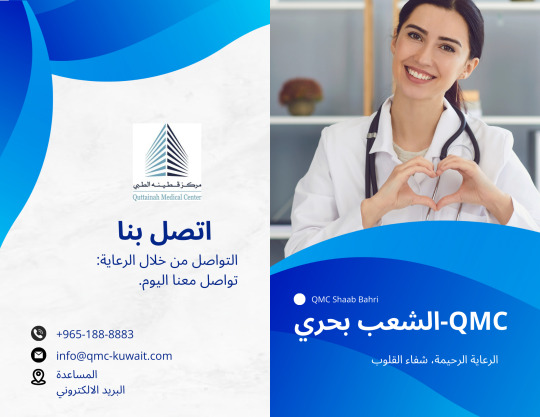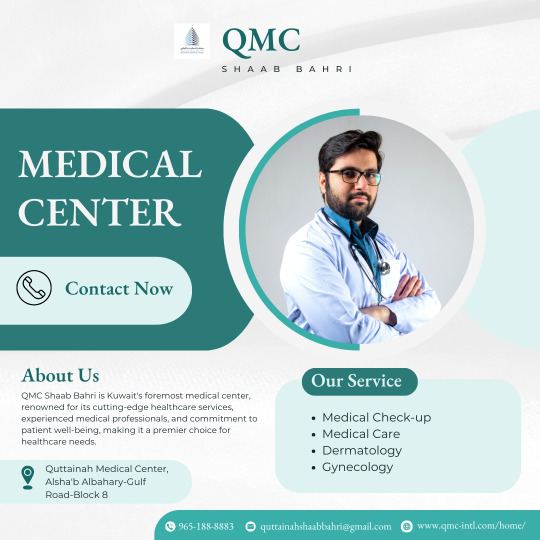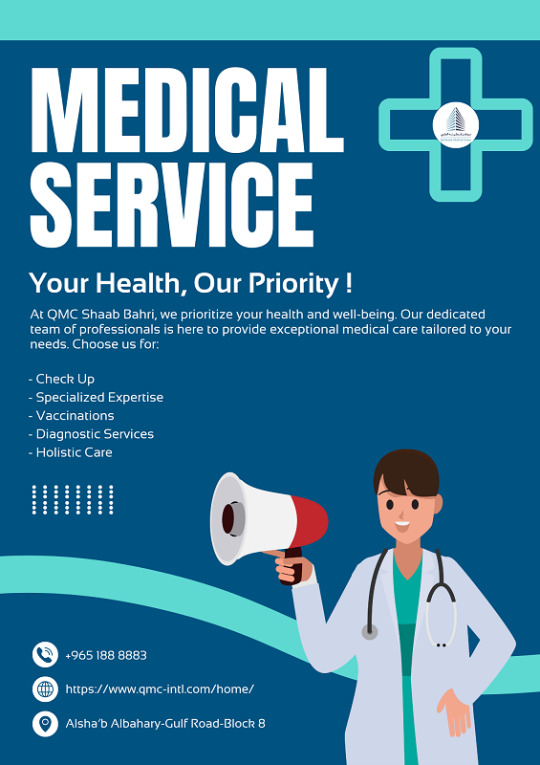QMC provides the highest standards of medical services, the center is fully fledged with the latest technologies, advanced techniques, specialized and skilled team to assure the best cosmetic and reconstructive results.
Don't wanna be here? Send us removal request.
Text
أفضل جراح تجميل في الكويت - خبرة موثوقة في مركز قطينة الطبي
في مركز قطينة الطبي في الشعب البحري، ستجد أفضل جراح تجميل في الكويت الذي يقدم خبرة لا مثيل لها في العمليات التجميلية وإعادة التشكيل. سواء كنت تفكر في شد الوجه أو نحت الجسم أو تجميل الأنف، يضمن فريقنا رعاية استثنائية ونتائج رائعة تتناسب مع أهدافك الجمالية.
خطوة نحو الجمال والثقة تبدأ هنا. احجز استشارتك الآن مع أفضل جراح تجميل في الكويت في مركز قطينة الطبي.
0 notes
Text
عيادة الجراحة التجميلية في الكويت - مركز قطينة الطبي
إذا كنت تبحث عن أفضل عيادة الجراحة التجميلية في الكويت، فإن مركز قطينة الطبي هو وجهتك المثلى. نقدم مجموعة متنوعة من خدمات التجميل، بما في ذلك عمليات تجميل الوجه، شد الجسم، وعلاجات الجلد بأحدث التقنيات الطبية. فريقنا من الجراحين والخبراء يتمتع بخبرة عالمية لضمان تحقيق النتائج التي تحلم بها.
في مركز قطينة الطبي، نؤمن بأن الجمال يبدأ من الثقة. لذا نسعى لتقديم تجربة مريحة وخدمات مخصصة لتلبية احتياجاتك الفردية. زورنا اليوم واستكشف مستوى جديد من التميز في عالم الجراحة التجميلية.
📞 اتصل بنا الآن لحجز استشارتك الأولى واستعادة جمالك الطبيعي بثقة!
0 notes
Text
"الجلدية" هي إحدى التخصصات الطبية المهمة التي تعنى بدراسة وعلاج الأمراض والاضطرابات التي تؤثر على الجلد والشعر والأظافر. تلعب الجلدية دوراً حيوياً في رعاية الصحة العامة، حيث تغطي هذه التخصصات مجموعة واسعة من الحالات بدءاً من الأمراض الجلدية البسيطة مثل حب الشباب والأكزيما، إلى الأمراض الأكثر خطورة مثل سرطان الجلد.
في مستشفى القوات المسلحة - الكويت (QMC-Kuwait)، تقدم أقسام الجلدية خدمات طبية متقدمة وشاملة للمرضى. يعمل الأطباء المتخصصون في هذا المجال على تقديم التشخيص الدقيق والعلاج المناسب للمرضى الذين يعانون من مختلف أنواع الأمراض الجلدية والتجميلية.
كما تتضمن خدمات الجلدية في QMC-Kuwait العديد من الإجراءات والعلاجات مثل إزالة الزوائد الجلدية، والتقشير الكيميائي، وعلاج حب الشباب، والليزر لإزالة الشعر، وعلاج التجاعيد، بالإضافة إلى الرعاية المستمرة للأمراض المزمنة مثل الصدفية والأكزيما.
0 notes
Text
Medical Museum Kuwait: A Journey Through Time
Step into the Quttainah Medical Museum Kuwait and embark on a journey through time. Our museum features a wide range of exhibits that highlight significant medical milestones and the pioneers who made them possible. Whether you're a history buff or simply curious, you'll find something to captivate your interest.
Enjoy a complimentary visit to our museum and discover the stories behind the medical innovations that shape our world today. Visit us for free and explore!
0 notes
Text
Top Tips for Selecting a Skin Laser Treatment Clinic in Kuwait Navigating the options for Skin Laser Treatment in Kuwait requires careful consideration. This article provides top tips for selecting the best clinic, including evaluating practitioner expertise, understanding the types of laser treatments available, and considering patient testimonials. Make a confident choice for your skin health.
0 notes
Text
مركز أمراض النساء في الكويت، المعروف باسم QMC-Kuwait، يعد من الرواد في تقديم الرعاية الصحية للنساء بأعلى مستويات الجودة والاحترافية. يوفر المركز خدمات شاملة لتشخيص وعلاج أمراض النساء، بما في ذلك الفحوصات الروتينية، وإدارة الحمل والولادة، والجراحات النسائية البسيطة والمعقدة. كما يتميز QMC-Kuwait بفريق طبي متميز من الأطباء والممرضات الذين يسعون دائمًا لتلبية احتياجات المرضى بفاعلية ورعاية شخصية عالية المستوى، مما يجعله وجهة مثالية للرعاية الصحية النسائية في الكويت.
0 notes
Text
في QMC-Kuwait، نحن نتفهم التأثير الذي يمكن أن يحدثه تساقط الشعر على ثقتك بنفسك واحترامك لذاتك. ولهذا السبب نقدم أحدث حلول زراعة الشعر المصممة خصيصًا لتلبية احتياجاتك الفريدة. فريقنا من الجراحين ذوي الخبرة متخصصون في أحدث التقنيات، بما في ذلك استخراج الوحدات البصيلية (FUE) وزراعة الوحدات البصيلية (FUT)، مما يضمن نتائج ذات مظهر طبيعي مع الحد الأدنى من الندبات. مركز قطينة الطبي الكويت
#مركز قطينة الطبي الكويت#مركز طبي في الكويت#جراحة زراعة الشعر في الكويت#dermatology center in kuwait
0 notes
Text
Comprehensive Women's Health at Quttainah Medical Center in Kuwait
Quttainah Medical Center is your go-to Gynecology Center in Kuwait, offering a wide range of services to meet all your women's health needs. Our skilled gynecologists provide expert care in a comfortable and welcoming environment. From routine exams to complex procedures, we are here for you at every stage of your life. Take control of your health and book an appointment with the best gynecologist at Quttainah Medical Center in Kuwait now. Your well-being is our mission!
0 notes
Text
مرحبًا بكم في متحف قطينة الطبي، حيث يلتقي الماضي بالحاضر للتثقيف والإلهام. في متحف قطينة الطبي، نحن ملتزمون بالحفاظ على التاريخ الغني للتقدم والممارسات الطبية. يعرض متحفنا مجموعة متنوعة من القطع الأثرية والأدوات والوثائق التي تسلط الضوء على تطور الرعاية الصحية في الكويت وخارجها. من طقوس الشفاء القديمة إلى الإنجازات الطبية الحديثة، يمكن للزوار استكشاف رحلة الطب الرائعة عبر العصور. مهمتنا لا تقتصر على تثقيف الزوار حول التقدم المحرز في العلوم الطبية فحسب، بل أيضًا تعزيز التقدير الأعمق للأفراد المتفانين الذين ساهموا في تحسين الرعاية الصحية في جميع أنحاء العالم. من خلال المعارض الجذابة والعروض التفاعلية، نهدف إلى إثارة الفضول وتشجيع الحوار حول أهمية الابتكار الطبي والتعاطف. احصل على زيارة مجانية الآن

1 note
·
View note
Text
قصة نجاح أفضل طبيب نسائية وتوليد في الكويت

في عالم الرعاية الصحية، يمثل الطبيب النسائي والتوليد شخصًا مهمًا للغاية للنساء في جميع أنحاء العالم. وفي الكويت، يبرز الدكتور أحمد المحمود كواحد من أفضل الأطباء في هذا المجال.
يتمتع الدكتور أحمد المحمود بخبرة واسعة في مجال النساء والتوليد، حيث يتمتع بمؤهلات عالية وتدريب متخصص. ولدى الدكتور أحمد خبرة طويلة في معالجة مجموعة متنوعة من الحالات، بما في ذلك المشاكل النسائية الشائعة مثل العقم، والأمراض التناسلية، والحمل والولادة.
بالإضافة إلى خبرته الطبية، يتمتع الدكتور أحمد المحمود بسمعة طيبة في مجتمع الرعاية الصحية في الكويت. يُشيد بتفانيه وتفهمه تجاه مرضاه، ويُعتبر من بين الأطباء الأكثر احترامًا وتقديرًا في المنطقة.
باعتباره أفضل طبيب نسائي وتوليد في الكويت، يمثل الدكتور أحمد المحمود الخيار الأمثل للنساء اللواتي يبحثن عن رعاية طبية عالية الجودة وشخصية. تجربته الطبية الغنية وسمعته الممتازة تجعله خيارًا موثوقًا لجميع احتياجات النساء في الكويت. معرفة المزيد عن الزيارة هنا, أفضل دكتور أمراض النساء في الكويت
#gynecology center in kuwait#medical center in kuwait#medical hospital#طبيب نسائي في الكويت#أفضل دكتور أمراض النساء في الكويت
1 note
·
View note
Text

QMC-Shaab Bahri stands as Kuwait's pinnacle of medical excellence, offering premier healthcare services. With state-of-the-art facilities, skilled professionals, and a commitment to patient well-being, it has become the trusted destination for superior medical care. Experience world-class treatment and compassionate service at QMC-Shaab Bahri, where health meets excellence.
#medical center in kuwait#medical hospital#gynecology center in kuwait#dermatology clinic in kuwait#dermatology center in kuwait#dermatology expert#dermatologyclinicinkuwiat#gynceology clinic in kuwait#breast augmentation#hospitals
0 notes
Text

QMC Shaab Bahri is Kuwait's leading and premier medical center, renowned for its state-of-the-art healthcare services. With a commitment to excellence, it offers a wide range of medical specialties, cutting-edge technology, and highly skilled professionals. Patients trust QMC Shaab Bahri for top-quality healthcare in the heart of Kuwait.
#medical center in kuwait#medical hospital#gynecology center in kuwait#dermatology clinic in kuwait#dermatology center in kuwait#dermatology expert#dermatologyclinicinkuwiat#gynceology clinic in kuwait
0 notes
Text
Leading and Premier Medical Center in Kuwait | QMC Shaab Bahri

QMC Shaab Bahri is Kuwait's leading and premier medical center, renowned for its state-of-the-art healthcare services. With a commitment to excellence, it offers a wide range of medical specialties, cutting-edge technology, and highly skilled professionals. Patients trust QMC Shaab Bahri for top-quality healthcare in the heart of Kuwait.
0 notes
Text
Genetics and Fertility: Key Insights and Advancements
Fertility genetics was once a neglected topic, but it is now gaining traction as science and technology advance and new options emerge. Extensive research has been done and is ongoing to identify the genetic factors that may be responsible for most IVF failures. Couples undergoing IVF treatment at an IVF center in Kuwait often have high hopes and expectations, but when the treatment fails, it can be devastating. Sometimes, everything may seem perfect, yet IVF still fails, confusing specialists. In these situations, the role of genes in fertility treatment comes into focus.
Although the precise cause of PCOS is unknown, experts believe hormonal imbalances and genetics play a role. PCOS is more prevalent in women who have a family history of the disorder. Lifestyle factors such as late working hours, unhealthy eating habits, lack of sleep, and exercise may also contribute to PCOS, leading to medical conditions such as obesity, which can further disrupt hormonal balance.
Types of Preimplantation Genetic Testing
Preimplantation genetic diagnosis (PGD)
PGD is a laboratory procedure to identify genetic conditions in embryos before implantation. It involves the biopsy and genetic analysis of a small number of cells from an embryo to determine if it carries a specific genetic mutation or condition. PGD is often used by couples who are known carriers of a genetic disorder and wish to prevent passing it on to their children.
Preimplantation genetic screening (PGS)
PGS is a laboratory procedure to identify chromosomal abnormalities in embryos before implantation. PGS is particularly beneficial for couples with a history of recurrent miscarriages or advanced maternal age, as the risk of chromosomal abnormalities increases. By selecting embryos with the correct number of chromosomes, PGS can improve the chances of a successful pregnancy.
Steps of Preimplantation Genetic Testing (PGT)
PGT is a step-by-step process that includes
Ovulation induction and egg retrieval
The woman is prescribed fertility medications to induce ovulation and produce multiple eggs. Once the eggs are mature, they are retrieved from the ovaries using a minimally invasive surgical procedure called transvaginal oocyte retrieval (TVOR).
Sperm collection
The man provides a semen sample. The sperm can be collected at home or the fertility clinic.
In vitro fertilization (IVF)
The eggs and sperm are combined in a laboratory dish to create embryos by the best gynecologist of the IVF center in Kuwait, using various techniques, including intracytoplasmic sperm injection (ICSI).
Embryo culture
The embryos are grown in a laboratory incubator for several days. This allows them to develop to a stage where they can be biopsied for genetic testing.
Embryo biopsy
Each embryo has a few cells taken for genetic testing. This is done using a minimally invasive technique called trophectoderm biopsy.
Genetic testing
The embryo cells are tested for specific genetic abnormalities. This can be done using various techniques, including preimplantation genetic screening (PGS) and preimplantation genetic diagnosis (PGD).
Embryo selection
The embryos free of genetic abnormalities are selected for implantation.
Embryo transfer
The woman's uterus is implanted with the selected embryos. The embryos are inserted into the uterus using a thin catheter.
PGT can be a complex and expensive procedure, but it can be a valuable tool for couples at risk of passing genetic disorders to their children.
Conclusion
Human reproduction is a natural process that typically involves marriage and procreation. Traditionally, elders advised couples to marry according to their kundali and gotra to avoid genetic problems. Fertility genetics now provides a scientific explanation for this advice.
Preimplantation genetic screening (PGS) is a boon for couples who want to have their genetic child. It is a procedure that can be performed at a gynecology center in Kuwait. PGS can help identify and select embryos free of genetic abnormalities, which can improve the chances of a successful pregnancy and healthy baby.
0 notes
Text

Experience exceptional dermatology service at QMC Shaab Bahri Kuwait. Our skilled team of dermatologists provides top-notch care, utilizing the latest technology and treatment methods. From skin conditions to cosmetic procedures, we prioritize your skin's health and beauty. Trust us for comprehensive, personalized care in a comfortable environment.
#dermatology clinic in kuwait#dermatology center in kuwait#dermatologyclinicinkuwiat#dermatology expert#medical center in kuwait#medical hospital#hospitals
0 notes
Text

QMC Shaab Bahri is Kuwait's leading healthcare facility, offering unparalleled medical services. With a commitment to excellence, our state-of-the-art facility boasts world-class doctors, cutting-edge technology, and a comprehensive range of services. Whether you seek diagnostics, treatment, or preventive care, QMC Shaab Bahri is your trusted destination for top-quality medical services.
Book now
#medicalcenterinkuwait#medicalclinicinkuwait#gynceologyexpert#dermatologyexpert#tummytucksurgeon#hospitals#clinic
0 notes
Text
The Best Way to Get Rid of Flaky Facial Skin From Dandruff and Rosacea
If you are dealing with flaky skin on your face, you should know that you are not alone in this. In Kuwait, many people face similar issues like dandruff and rosacea, which can cause your skin to become dry, flaky, and irritated.
The good news is that at Quttainah Medical Center in Kuwait, various dermatological treatments can help you regain the beautiful, glowing skin you desire.
In this post, we will discuss the best ways to treat flaky facial skin caused by dandruff and rosacea.
Continue Reading!
What is Flaky Skin?
Flaky skin is a condition in which the skin on your face gets dry, irritated, and begins to peel. Flaky skin can be caused by genetics, weather, nutrition, or skincare routine. In addition to these reasons, dandruff and rosacea can cause flaky skin.
If you face persistent skin problems, consider consulting a dermatology hospital in Kuwait for expert guidance and treatment.
What are the Different Skin Types?
Normal Skin
It's essential to understand the different types of skin and their characteristics. Normal skin type is characterized by tiny pores, smooth texture, and a healthy glow.
It is considered the most balanced skin type with good moisture and oil production balance.
Oily Skin
Oily skin type is characterized by excess oil production, resulting in a shiny appearance and larger pores. People who have oily skin are more likely to experience acne and breakouts.
Dry Skin
Dry skin type is characterized by a lack of moisture and oil production, leading to flakiness, itchiness, and a dull appearance. Individuals who have dry skin may encounter sensitivity issues when using certain skincare products.
Both Dry and Oily skin
Combination skin is a type that is a mix of both oily and dry skin. Typically, individuals with combination skin have an oily T-zone, including the forehead, nose, chin, and dry cheeks.
Sensitive Skin
This skin type is known for being sensitive and reacting to specific skincare products and environmental factors, resulting in irritation, redness, and itching.
People with sensitive skin may also be more susceptible to conditions such as rosacea.
General Causes of Flaky Facial Skin
Dry skin is one of the most prevalent reasons for flaky skin. When your skin loses moisture, it can become dry, itchy, and flaky.
Other reasons for flaky skin include harsh soaps and skincare products, hot showers, and climatic factors such as wind, freezing temperatures, and low humidity.
Dandruff and Rosacea: The Flaky Skin Connection
Dandruff is a condition that affects the scalp, but it can also cause flaking and dryness on the face. Dandruff is caused by an overgrowth of yeast on the scalp, leading to redness, itching, and flaking. When dandruff particles fall onto the face, they may lead to flaky skin.
Rosacea is a chronic skin condition that causes redness and inflammation on the face. Although rosacea itself does not cause flaky skin, it can contribute to it by causing dryness and irritation. Rosacea can also make the skin more sensitive to other irritants, such as harsh cleansers and moisturizers.
Here are some specific ways that dandruff and rosacea can contribute to flaky skin:
Dandruff Flakes
Dandruff flakes are typically white or yellowish and can be small or large. They can fall onto the face and cause flaky skin around the hairline, forehead, nose, and cheeks.
Dryness
Rosacea can cause the skin to become dry and irritated, which can lead to flaking.
Sensitivity
Rosacea can make the skin more sensitive to other irritants, such as harsh cleansers and moisturizers. These irritants can cause the skin to become dry and flaky.
Inflammation
Rosacea causes inflammation of the skin, which can also contribute to dryness and flaking.
Expert Tips for the Treatment of Flaky Skin
Flaky skin can be an annoying and ugly condition, but there are actions you can do to control and cure it.
Follow these expert tips suggested by the best dermatology doctors from Quttainah Medical Center, a leading dermatology center in Kuwait for treating flaky skin.
1. Wash your face twice in a day
Keeping your face clean and free of excess oil helps to avoid facial dandruff. Wash your face twice a day, once in the morning and once at night, with a smooth, fragrance-free cleanser.
2. Apply moisturizer after cleansing
Moisturizing your skin after washing can help avoid dryness and flaking. Look for a moisturizer that is suited for your skin type and apply it liberally after washing your face.
3. Exfoliate your skin twice a week
Exfoliating your skin can aid in the removal of dead skin cells and the prevention of flaking. However, use a light exfoliator since abrasive scrubs might irritate your skin and exacerbate dandruff.
Consider utilizing a product containing salicylic acid, which can aid in the breakdown and removal of excess oil.
4. Avoid using harmful products
Harsh soaps, scrubs, and other skincare products can strip your skin of its natural oils, contributing to face dandruff. Choose mild, fragrance-free products made for sensitive skin.
5. Consult with a dermatologist
If you're still dealing with facial dandruff despite your best efforts, it's time to consult with a dermatology clinic in Kuwait. They can assist you in determining the underlying cause of your dandruff and recommending appropriate treatment solutions.
Schedule Your First Dermatology Consultation at Quttainah Medical Center in Kuwait
If you are struggling with flaky facial skin caused by dandruff or rosacea, the best solution is to consult with a dermatologist and follow a skincare routine that is customized to your specific needs.
At Quttainah Medical Center in Kuwait, a reputable dermatology clinic in Kuwait, our experienced team can provide expert guidance and effective treatment options to manage these conditions and achieve healthier, flake-free, and radiant skin.
Schedule your dermatology consultation today to start your journey towards a brighter, more confident tomorrow.
#medical center in kuwait#medical hospital#dermatologyclinicinkuwiat#dermatology center in kuwait#dermatology expert
0 notes